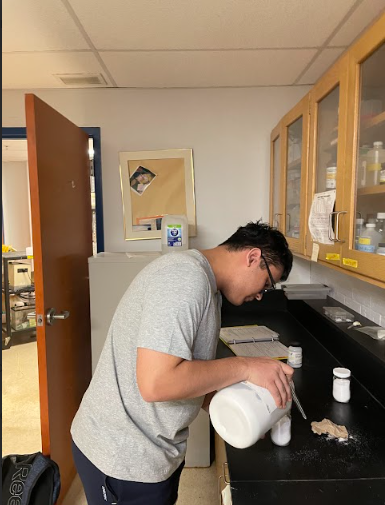Internships offer hands-on learning and opportunities to explore new career paths. With internships at cancer research labs, physical therapy offices and dental hygiene, students are able to join the workforce and gain real-world skills.
Internship periods can be utilized for both internships and apprenticeships, essentially, any work-based learning opportunity. An internship can be paid or unpaid, with a minimum of 75 required hours for a single period internship and 150 required hours for a double period internship per semester.
While apprenticeships require a minimum of 235 working hours, an apprentice gets paid minimum wage and usually concludes with a certification. These certificates often allow for students to directly join the workforce without further education or training. For example, apprenticeships opportunities can be in the fields of dental hygiene and construction.
In order to receive class credit for internships, students must file the appropriate paperwork with work-based learning coordinator Michelle McMahon. Internship periods are versatile in that they can be during or after the school day and inside or outside school. Ninth periods can be added to accommodate internships outside of the regular seven period school day. Students can take multiple internship periods to travel off-campus to work in-person or virtually. “Probably half of our student interns work for Wootton staff and then the rest are in a variety of different types of internships both virtual and in-person outside of Wootton,” McMahon said.
Within the school community, students like senior Jasmine Geeng intern as teacher assistants for staff members. “I think being an intern is valuable because it teaches you skills like leadership and collaboration. I help students when they miss class or are struggling with something. I decided to intern [for Honors Chemistry and Ceramics 1] because I liked the subjects since I took them as a class before,” Geeng said.
Out-of-school student interns work at National Aeronautics and Space Administration (NASA), National Children’s Hospital, Shady Grove Hospital, Holy Cross Hospital, Johns Hopkins Applied Physics Lab (JHUAPL), National Institute of Health (NIH), Cava, Lifetime Fitness and Playa Bowls. Students who interned through the summer RISE program were able to extend their internships into the school year and receive credit. “Any type of job that you have can be an internship because the goal is to get some work-based learning,” McMahon said.
In-school internship opportunities include more than assisting teachers in the classroom setting and offer more than just career experience. For example, internships for the athletic director, athletic trainer and adapted PE classes allow students to donate their time and effort to the school community. “I feel like those [adapted PE] students really get short changed when they don’t have enough help and it’s so joyful for them and it’s such a great experience impacting them. I think many students [interns] get a lot out of it,” McMahon said.
The customizability of schedules allows students to save time and money in the future because they are able to narrow down possible career paths. “I think for someone who’s thinking of that as a career, it might solidify that thought or not, but that’s OK because now you’ve crossed that off the list. Maybe it’ll save you money in college and you realize you don’t really like what you’re studying,” McMahon said.
Senior and former AP Chemistry student Ayush Garg interns during an AP Chemistry class, but enjoys exploring the field of chemistry in his free time. “I don’t want to pursue a career in chemistry, but it’s really rewarding. I like chemistry as a class because it’s so varied and balanced between academics and hands-on learning in labs.”
This year there are 120 student interns compared to last year’s 75 interns and they predominantly consist of seniors. Internships put students in a more adult role as they must keep up with their regular class schedule in addition to internship assignments. “It’s definitely challenging to balance rigorous class work with the internship assignments, but they help me reflect on the work I’ve done,” Garg said.








![Editors-in-Chief Ahmed Ibrahim, Helen Manolis, Cameron Cowen, Alex Grainger, Emory Scofield, Hayley Gottesman, Rebekah Buchman and Marley Hoffman create the first print magazine of the year during the October press days. “Only a quarter of the schools in MCPS have programs that are like ours, a thriving, robust program. That makes me really sad. This is not just good for [the student journalists] to be doing this, it’s good for the entire community. What [student journalists] provide to the community is a faith in journalism and that continues for their lifetimes," Starr said.](https://woottoncommonsense.com/wp-content/uploads/2025/10/wmpoFTZkCPiVA3YXA4tnGoSsZ4KmnKYBIfr18p3l-900x1200.jpg)